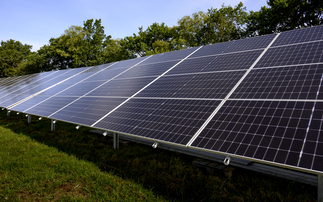Joe Biden in the White House, and potentially Democrats in control of the Senate too, could turbo-charge climate change as an investment theme, argues Schroders' Simon Webber
The US response to Covid-19 looks set to be the dominant election issue as we head towards the November polls. Myriad other issues also compete for voters' attention, and climate change often takes lower billing on the US political agenda than it does in Europe.
However, the election outcome will be significant for climate change, both in terms of policy and the potential effect on related investments.
Given Joe Biden's lead in the polls, we think investors should factor in a Democrat Administration as a base case when it comes to valuing stocks across a range of industries.
In the case of climate change the policy positions of the two parties are so different that the election outcome will be exceptionally important to the investment outlook for the companies affected. So far, the scenario of Biden winning the election is not yet incorporated into share prices, in our view.
Detailed plans for net zero emissions
Biden's key climate pledges are, as you would expect, aligned with those of the House Democrats, who recently unveiled their own climate plan. Perhaps the most important is for the US to achieve net zero greenhouse gas (GHG) emissions by 2050, in line with the EU's deadline in its "Green Deal" plans.
Setting distant deadlines is the easy part. Those deadlines won't be met unless there are near-term goals that must be achieved to keep the long-term plan on track.
Biden's energy policy focuses on renewables, with some measurable near-term objectives. These include installing 500 million solar panels and 60,000 wind turbines within five years.
The plan produced by Democrat lawmakers gives further details, and highlights the scope of their ambition. The net zero emissions deadlines are already coming into view for a number of industries: from 2030, new buildings would need to achieve net zero carbon emissions, with new cars following in 2035 and power producers in 2040.
Agreement on the need for infrastructure
The US's trade approach to China is one area that has drawn bipartisan support in these polarised times. Another issue where there is significant agreement across party lines is the need to invest in infrastructure. Press reports suggest President Trump is considering a $1tr infrastructure plan to boost the economic recovery from Covid-19. This would be largely focused on roads and bridges, with some spending also on 5G networks and rural broadband.
Biden's climate policies highlight infrastructure as crucial in the climate change battle. Some of the policies are aimed at areas that can reduce future emissions: the target of 500,000 electric vehicle charging stations by 2030, for example.
However, other proposed infrastructure spending also recognises that climate change is already happening, and is targeted at mitigating its effects. Building resilient cities that can withstand wildfires, floods and rising sea levels is part of Biden's plan. This incorporates roads and bridges, but also a green power grid and improved water infrastructure.
While these areas would enjoy greater investment under Biden and the Democrats plans, others would lose out. Ending subsidies for fossil fuels is part of Biden's proposal. This would represent a clear break with current policies as the fossil fuel lobby is an important part of President Trump's base.
Will climate change continue to polarise US opinion?
The two leading candidates for the US presidency offer a binary choice when it comes to climate change policy. However, that polarisation may not last much longer. Younger members of the Republican Party have been calling for the leadership to support greater federal action in combating climate change.
It may be that, whatever the outcome of this election, greater consensus emerges afterwards on the need for stronger action, even if the policy prescriptions are still heavily debated.
The need to prepare for climate change and reduce emissions is something that individual states have been aware of for some time. California, for example, is the US leader in solar power, with 18 per cent of electricity generated coming from solar in 2019.
And other states can harness the benefits of their location. Simple economics, rather than deliberate climate policy, is seeing states in the blustery Midwest turn increasingly to wind power as the cost continues to fall, leaving wind cheaper than other power sources.
What is more, Biden and the Democrats have been quick to point out that these climate policies can be a source of job creation, at a time when the US - and other economies - have seen their jobs market battered by Covid-19. The 60,000 wind turbines mentioned above, for example, will be "made-in-America" turbines, according to Biden's plan.
Biden reclaiming US as a climate leader
Under Biden, the US would also re-join the 2015 Paris Agreement. Signatories to the agreement commit to limiting the rise in global temperatures to 2C compared to pre-industrial levels. The US was a signatory in 2015, under President Obama, but President Trump vowed to leave the agreement.
The Covid-19 crisis has refocused international attention away from the climate crisis and towards health concerns. This year's UN Climate Change Conference (COP26), due to be held in Glasgow, has been postponed until November 2021 due to the pandemic.
But climate change is still happening even if our attention is elsewhere. By re-committing to the Paris Agreement, Biden could help galvanise the global efforts to combat climate change and re-inject momentum into decarbonising the global economy.
Specifically, we think a Biden presidency could see the US and Europe work together to put pressure on China to meet its climate commitments. The trade dispute with the US and the US's own flagging commitment to the climate agenda has provided a fig leaf for China to hide behind on the climate change issue. However, China is eager to be a global leader and would not want to be perceived as a laggard on such an important issue.
A re-committed US, standing alongside Europe, could have much greater sway in ensuring a level playing field when it comes to decarbonisation.
Potential to turbo-charge climate change investments
Let's look at electric vehicles to give an idea of the potential scale and pace of change ahead. Globally, sales of electric cars topped 2.1 million in 2019, according to the IEA. That was a 40 per cent year-on-year increase, but still meant electric cars accounted for just 2.6 per cent of global car sales. Meanwhile in the US, car and light vehicle sales were over 17 million.
In 15 years' time, those would all need to be electric if the 2035 deadline becomes law. Having taken 15 years to go from zero to just 2.6 per cent penetration, electric vehicles would head towards 100 per cent in the next 15 years.
The economic arguments in favour of the energy transition will remain in place whoever wins the election. We see strong prospects for investments in this area whatever the outcome. However, a Biden victory, especially if combined with the Democrats taking the Senate, would add huge impetus to the transition. The growth outlook for electric vehicles, renewables, hydrogen power, battery storage, and many more industries would be turbo-charged in this scenario and investors should prepare for that possibility.
Perhaps most importantly, and most overlooked by investors, is the prospect of greater focus and alignment of international politics around the need to decarbonise quickly. This would provide the impetus for the rest of the world to follow the US and European lead. Then we stand a real chance of making a successful low carbon transition, with all the investment consequences that that will bring.
Yet investors are systematically poor at factoring in change before it happens - these policy developments will probably come as a surprise to many when they come, despite the clear probabilities that should already be placed on them coming to pass.
Simon Webber is lead portfolio manager at Schroders
The Net Zero Investment Hub is brought to you in partnership with Schroders, as part of its support for the world's first Net Zero Festival this autumn. All the content on the Hub is fully editorially independent unless otherwise stated.
You can find out more about the Net Zero Festival and reserve your place here.








